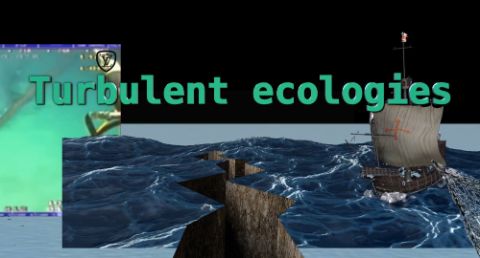There is No Such Thing as Past or Future!
AI Colonialism, Ancestral Immediacies, and the Order of the Multiple Present
Film screening and Keynote
Sat., 29.7.2023
14:00–15:00
Safi Faye Hall
in English with simultaneous German translation
Free entry

Tabita Rezaire, Deep Down Tidal (film still, detail), 2017. Courtesy Tabita Rezaire and Goodman Gallery
The English language tells us that time passes, like a river, and that we have no choice but to go along and follow its course. Or do we? Water spirits and quantum physics agree that time is circular, multiple, potentially spatial rather than sequential. The ocean in particular has not only held spirits and sorrows; today it hosts the infrastructure of the information superhighway,with thick cables roping their way along the former route of the transatlantic trade of enslaved peoples to provide the world with superfast internet. This sharing of space is simultaneously pluriversal and violent; violence that, as Martiniquan poet Édouard Glissant suggests, we must understand as productive, for better or for worse. Looking into the waterways and infrastructures of what we today understand as digital colonialism, the filmic video collage Deep Down Tidal by artist Tabita Rezaire serves as a visual prompt for a provocation by investigative journalist and data scientist Karen Hao. From water to infrastructure, Hao’s work on digital colonialism has taken her across the globe to look into the effects of an unequally distributed system of technological power.
Deep Down Tidal, Tabita Rezaire, 2017, HD video, 19'
Deep Down Tidal is a video essay by French-Guayanan artist Tabita Rezaire that explores the oceanic dimensions of Information and Communication Technologies. The ocean becomes the interface for a complex and multiplicitous space of information exchange, as political, cosmological, spiritual and technological narratives emerge and wash over each other within the complex infrastructure of what we today call digital colonialism.
AI and its Old World Order
Or: How AI is enriching a powerful few by dispossessing communities that have been dispossessed before
Impulse Keynote by Karen Hao
Over the last few years, a growing number of scholars have argued that the impact of AI is repeating the patterns of colonial history. If European colonialism was characterized by the violent capture of land, extraction of resources, and exploitation of people for the economic enrichment of the conquering country, the AI industry is now using more insidious means to capture our behaviours, extract our data, and exploit our labour for enriching the wealthy and powerful at the great expense of the poor.
This talk will take an in depth look at just one dimension of this AI colonialism: labour exploitation. The AI industry has long thrived off of a model of building billion-dollar products off of a vast economically precarious workforce. Now it is refining its playbook, seeking out workers in countries of crisis to drive down their labour costs even more.